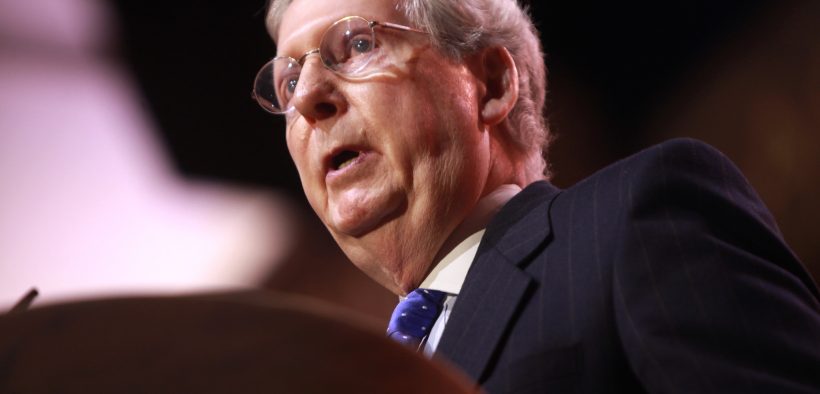Coronavirus Stimulus Bill Fails To Move Forward In The Senate

“Central to Democrats’ concerns with the legislation was a $425 billion ‘slush fund’ for the Federal Reserve, which it could use to bailout businesses while also withholding the names of those companies for up to six months.”
Senators efforts failed Sunday to secure emergency funding for the Covid-19 pandemic. Democrats in the Senate voted against a $1.8 trillion stimulus package, stopping it with a 47-47 vote. Central to Democrats’ concerns with the legislation was a $425 billion “slush fund” for the Federal Reserve, which it could use to bailout businesses while also withholding the names of those companies for up to six months, according to POLITICO.
‘Not Big Enough’
“We’re not here to create a slush fund for Donald Trump and his family, or a slush fund for the Treasury Department to be able to hand out to their friends,” said Sen. Elizabeth Warren, D-Mass. “We’re here to help workers, we’re here to help hospitals. And right now, what the Republicans proposed does neither of those.”
Part of the fund, $58 billion, would have been allocated to the US aerospace industry, which has seen airlines and manufacturers brought to a standstill over the global shutdown. However, the remainder would have been left for Treasury Secretary Steven Mnuchin to make the call on which businesses to fund.
Democrats remained unconvinced after three days of closed door meetings.
“In the midst of an unprecedented national crisis, Republicans can’t seriously expect us to tell people in our communities who are suffering that we shortchanged hospitals, students, workers and small businesses, but gave big corporations hundreds of billions of dollars in a secretive slush fund,” said Sen. Patty Murray, D–Wash.
Democrats also took issue with what they felt was an inadequate amount of unemployment assistance. They demanded four months, but the Republican-authored legislation included only three. The bill also fell short of their expectations in regard to healthcare funding, food assistance, and allocations for state governments, The New York Times reported.
“It’s not big enough, it’s not bold enough,” said Sen. Doug Jones, D–Ala. “It doesn’t get to the cities, into the communities. It doesn’t get to individuals. It’s a start, but it is not there — it’s not even half a loaf, it’s a couple of slices.”
Different Than TARP
Republicans defended the bill, especially the provision allowing for Mnuchin to have sole control over the Treasury’s fund and the need for withholding the names of businesses that accept relief money.
“One of the lessons learned from TARP (Troubled Asset Relief Program) in 2008 was the concern that companies had about being identified publicly as soon as they accepted TARP assistance,” said a GOP official. “It caused an assumption that those companies might be headed for a terminal event.”
TARP, which bailed out the financial services industry during the 2008 recession, included four provisions for oversight of the funds, POLITICO reported. Democrats argued against the new bill because it includes none of the same regulatory oversight.
Republican legislators were quick to point out that the situation in 2008 was different than the current crisis, however, as the former was caused by reckless negligence, but Covid-19 is beyond the control of business executives.
Despite the differences between the two parties, they did reach agreement on providing Americans checks in the mail, beginning at $1,200 for workers earning up to $75,000, and $500 for each child. However, with the direct stimulus contingent upon the passage of the entire $1.8 trillion bill, it will be delayed until the two parties iron out their differences.
More Work To Do
Senate Majority Leader Mitch McConnell, R–Ky., said the Republicans would push for a new vote on Monday and cited the urgency of the matter, according to Financial Times.
“This national crisis is not going to wait around if Congress slips back into conventional politics or haggles endlessly over the finer points,” McConnell said.
Even if the Republican-designed emergency stimulus bill passes the Senate, it must also be reconciled with the House of Representative’s version before it can go to Trump’s desk. Speaker of the House Nancy Pelosi, D–Cali., met with Mnuchin and McConnell on Sunday to discuss how the two sides might arrive at a workable bill. The meeting ended without agreement, the New York Times reported.
“We’ll be introducing our own bill and hopefully, it will be compatible with what they discussed in the Senate,” Pelosi said while exiting McConnell’s office.




















The Great American Government is fatally flawed by the seniority system in Congress, riders upon riders in legislative bills, and the degeneration of political parties into monopolistic special-interest conglomerates. The people continue to flock to the polls so that (they like to think) “their voices will be heard”, time after time re-electing the same big-time crooks to office whom they then rate very, very lowly in opinion polls. Aw, who cares anyway, as long as there’s McDonald’s and football and baseball…hey, wait a minute! Where the hell is the baseball? (Epidemiologists put the world on notice long, long ago that the next pandemic, of unknown proportions, was a matter of when, not if. So, the government did — what? — in preparation?)